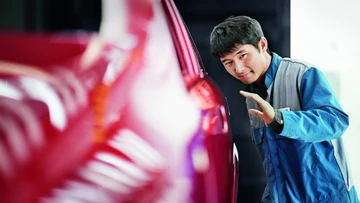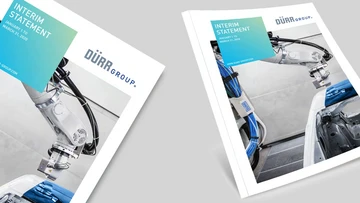Bietigheim-Bissingen, July 29, 2020 – The Dürr Group is registering a slow improvement in business confidence and is revising its forecast for 2020. As things currently stand, order intake should reach € 3,100 to 3,400 million, while a range of € 3,200 to 3,400 million has been defined for sales. After sharp increases in the first half of the year, cash flow from operating activities is also expected to be clearly positive for the year as a whole. A target corridor of 2.5 to 2.8 % has been defined for the operating EBIT margin, implying an appreciable improvement in performance in the second half of the year. The Group is adopting an efficiency program in response to the market weakness in European automotive business. Despite the expense of € 35 to 45 million budgeted for this purpose, EBIT after extraordinary effects is expected to reach slightly positive territory in 2020. Together with the positive effects from efficiency measures that have already been adopted, the Group anticipates annual savings of around € 60 million from 2021.
In the first half of 2020, the corona crisis exerted pressure on the Dürr Group’s business to the extent expected. According to preliminary figures, order intake dropped by 22.8% to € 1,483.0 million. The months from March to May as well as the markets in Europe and the Americas were particularly affected. On the other hand, order intake in China rose by 60.6%, underpinned by strong demand for production technology for electric vehicles as well as growth in environmental technology and in business with the furniture industry. Other markets alongside China have also recently been displaying signs of a gradual recovery in demand. Accordingly, order intake is expected to be higher in the second half of the year than in the first.
Sales dropped by 14.1% to € 1,615.2 million in the first half of the year. Operating EBIT came to € 23.7 million; even after extraordinary effects of € -17.1 million, EBIT was still positive at € 6.6 million (EBIT margins: 1.5% and 0.4%, respectively). In the second quarter, operating EBIT came to € -8.9 million. After extraordinary effects, EBIT stood at € -16.4 million. It came under pressure from low capacity utilization, disproportionately sharp declines in service business as well as corona-related problems with deliveries and order execution.
Cash flow from operating activities increased to € 106.0 million in the first half of the year (H1 2019: € -112.9 million), reflecting a decline in net working capital to € 410.1 million (June 30, 2019: € 603.4 million). The Dürr Group anticipates a moderate accumulation of net working capital in the second half of the year in the wake of the expected recovery in business. Total liquidity (including time deposits) reached a new high of € 904.1 million as of June 30, 2020.
Cost base to be reduced by € 60 million in 2021
Business with the automotive industry sustained the greatest declines. Whereas there are signs of automotive business returning to normal in Asia and the Americas, the Board of Management expects to see protracted weakness in demand in the saturated European market. In response to this, the Dürr Group will be adopting an efficiency program to achieve savings of around € 30 million from 2021. Among other things, this includes a reduction of around 600 jobs in automotive business in Germany and in other European countries. This will entail extraordinary expense of € 35 to 45 million, which will be recognized in the second half of the year.
The Dürr Group previously initiated further optimization measures at the beginning of 2020, which should yield savings of about € 10 million from 2021. Among other things, the loss-making Karlstein site (Application Technology) was closed and production in Goldkronach (Clean Technology Systems) discontinued, necessitating extraordinary expense of € 6.1 million in the first half of 2020.
All in all, extraordinary expense is expected to come to € 75 to 85 million in 2020. Most of this will be for the measures mentioned above together with purchase price allocation effects. Despite the extraordinary expense, an EBIT margin of 0 to 0.5% is projected for 2020.
The savings in European automotive business (€ 30 million) and from the other measures in progress since the beginning of the year (€ 10 million) are to be joined by further cost-reductions of around € 20 million in 2021 resulting from the efficiency measures announced in November 2019 for HOMAG in Germany. As a result, the cost base should decrease by around € 60 million from 2021, substantially lowering the Group’s breakeven threshold.
Due to the still outstanding detailed planning of the efficiency measures, the full-year forecast for the divisions will be postponed until November 5, 2020, when the figures for the first nine months are presented. As announced, the full financial report on the first half of 2020 will be published on August 6. There will be a conference call with the Board of Management for investors and press representatives at 2:30 pm on July 30.









